Unit 1 collecting stamps is my hobby 课件 (共39张PPT)
文档属性
| 名称 | Unit 1 collecting stamps is my hobby 课件 (共39张PPT) | 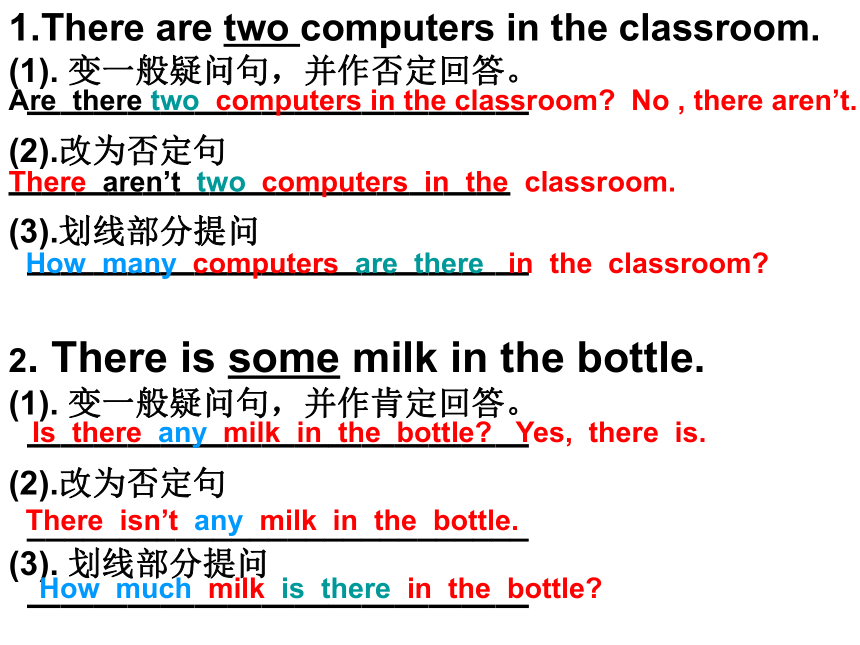 | |
| 格式 | zip | ||
| 文件大小 | 2.3MB | ||
| 资源类型 | 教案 | ||
| 版本资源 | 外研版(三年级起点) | ||
| 科目 | 英语 | ||
| 更新时间 | 2018-10-11 10:05:33 | ||
图片预览

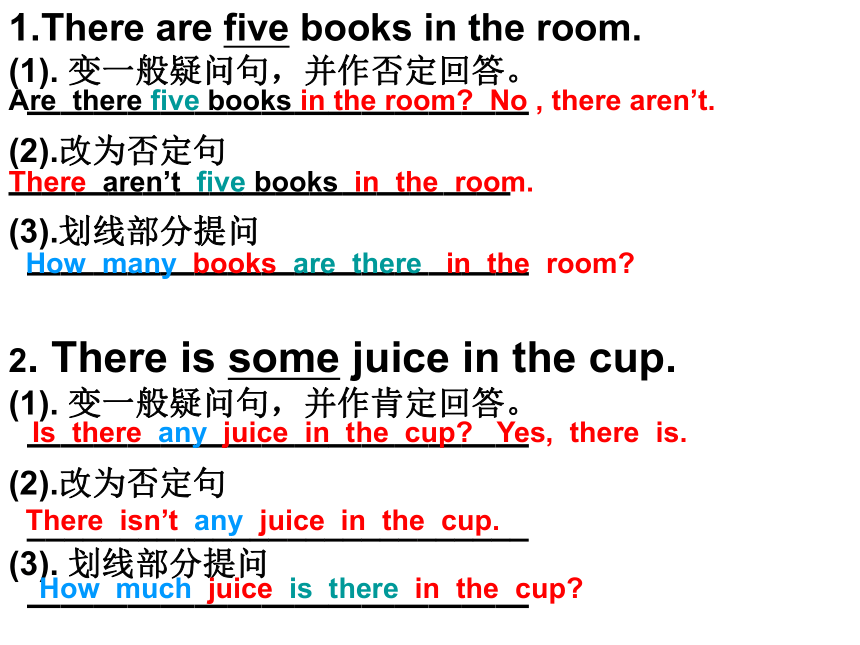
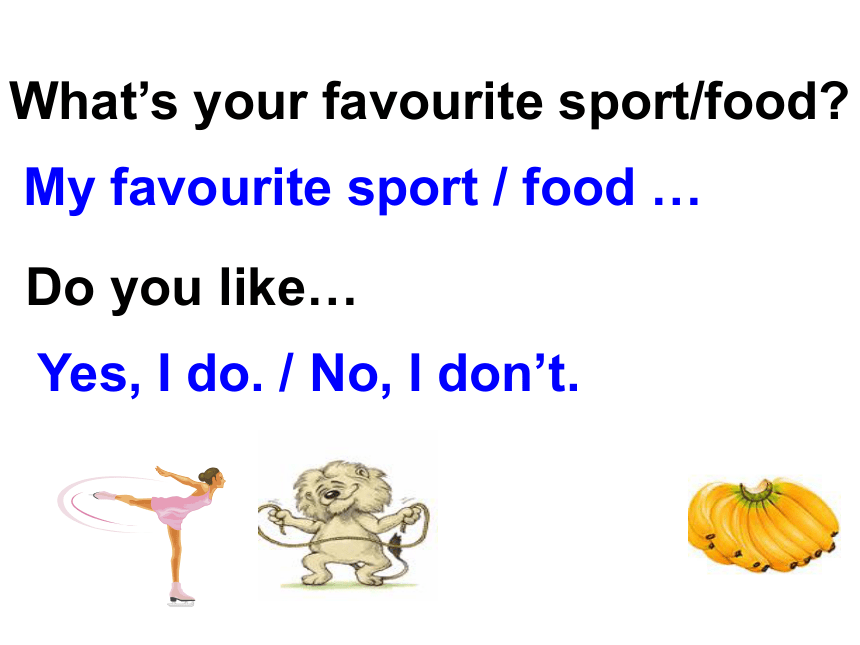
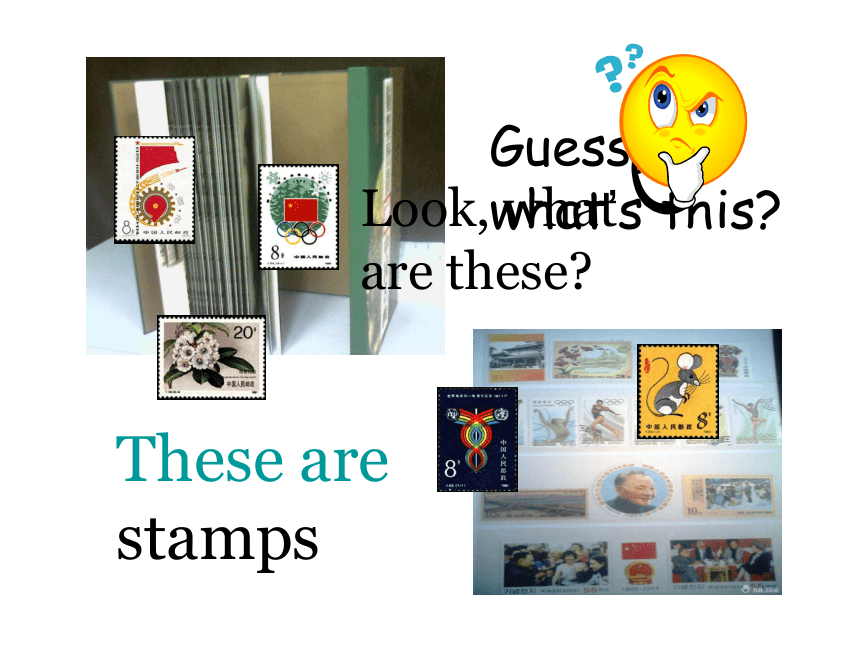

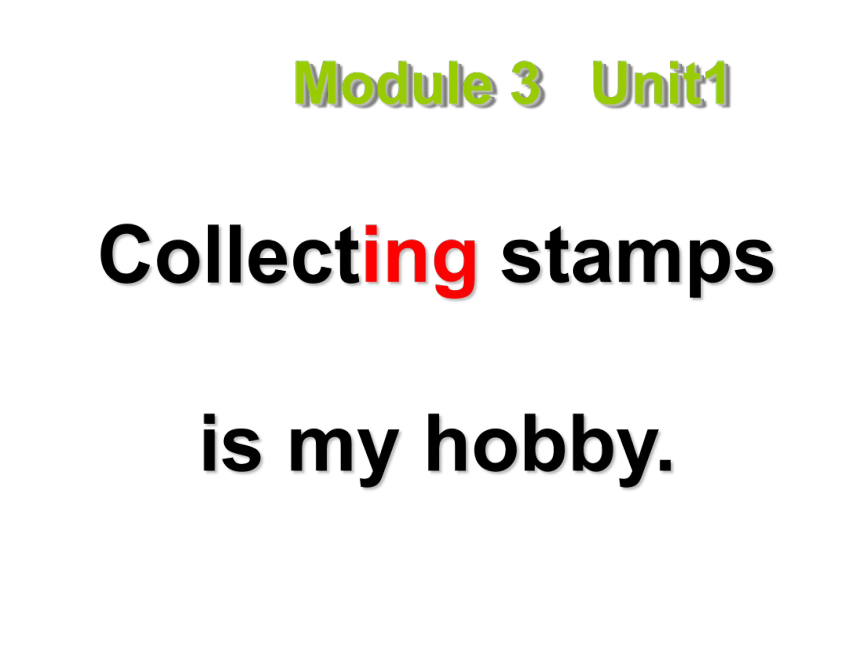
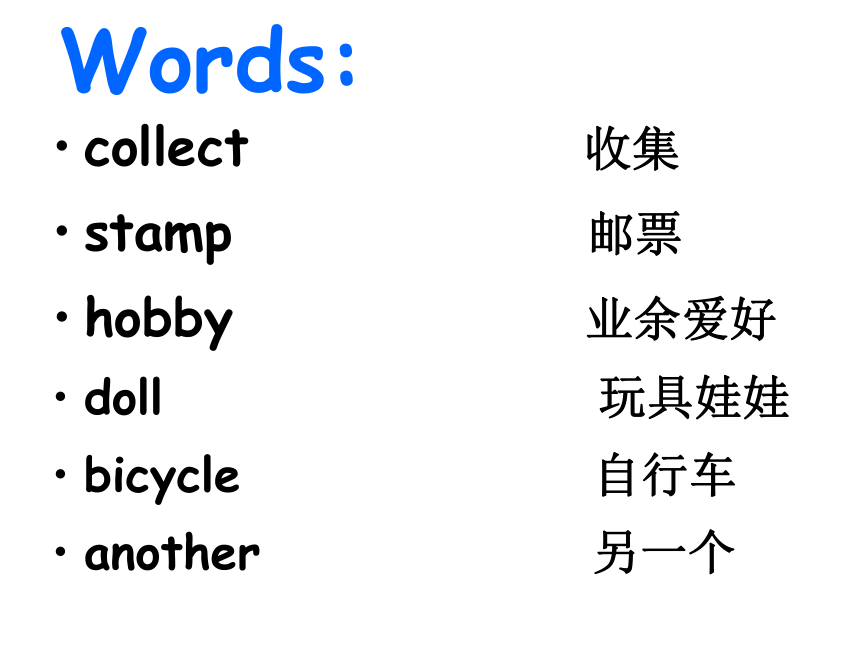
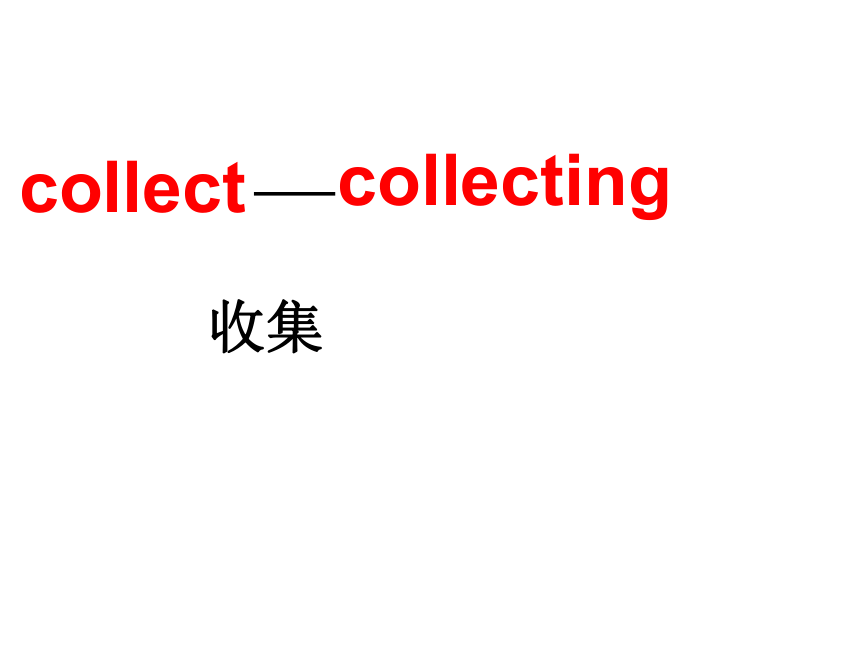
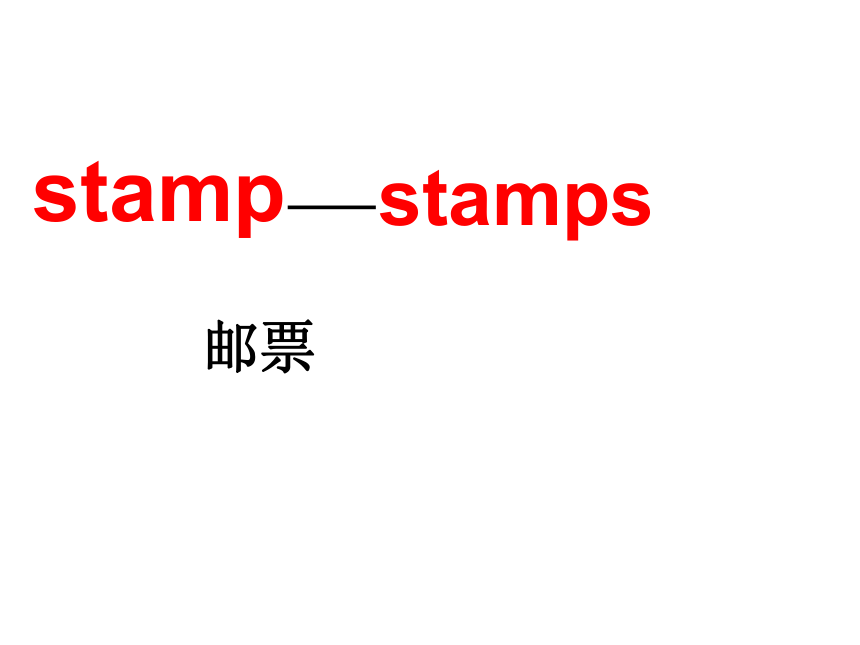
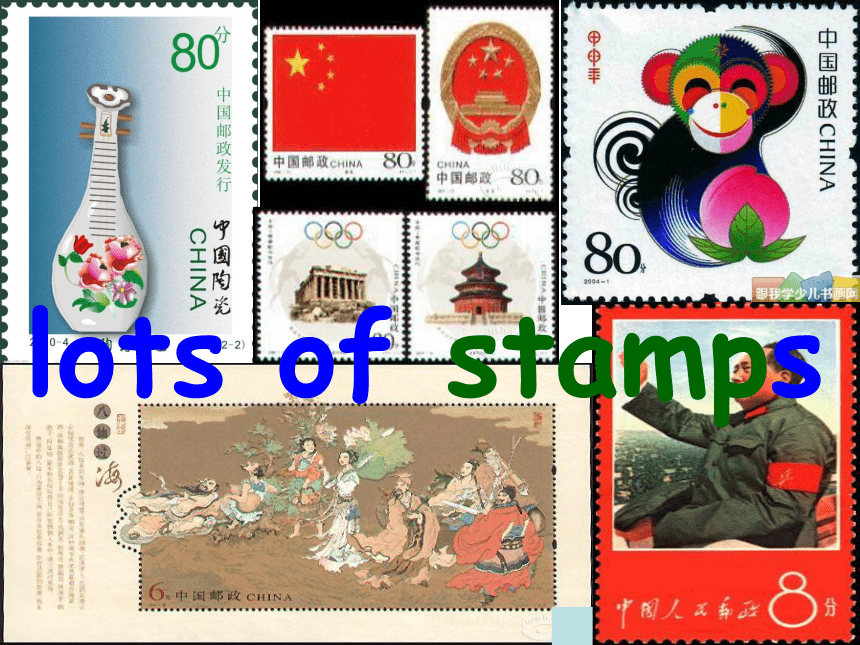
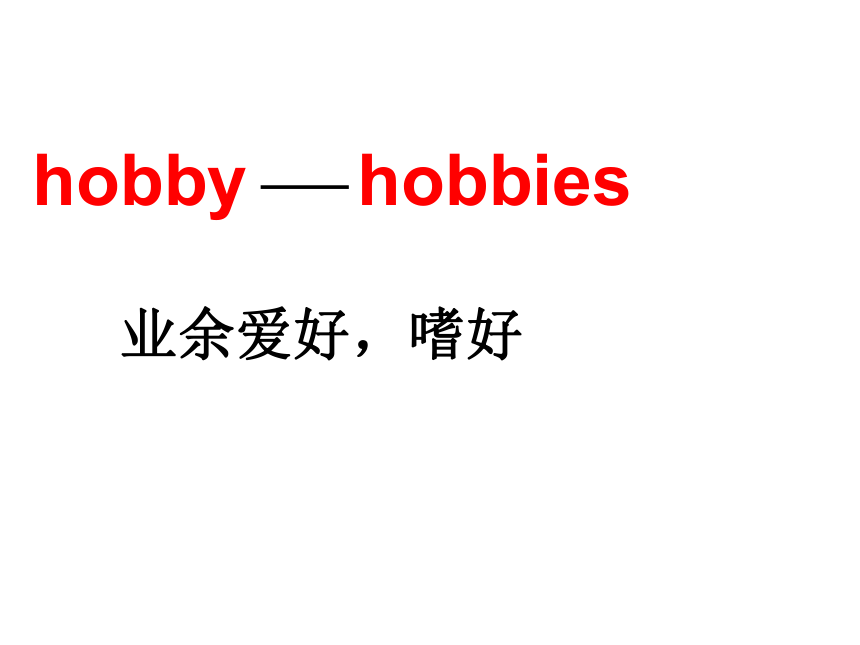
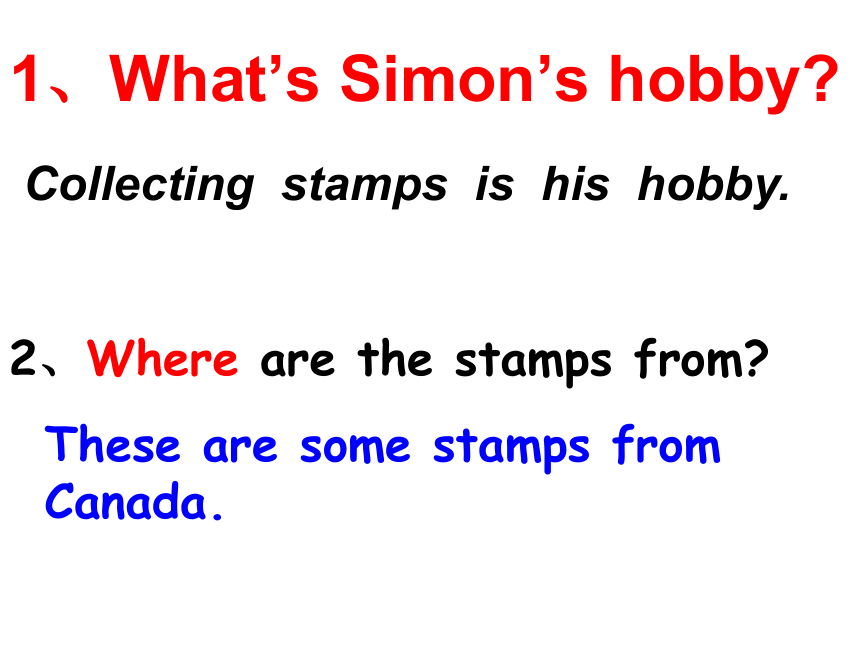
文档简介
课件39张PPT。There are two computers in the classroom.
(1). 变一般疑问句,并作否定回答。
———————————————
(2).改为否定句
———————————————
(3).划线部分提问
———————————————
2. There is some milk in the bottle.
(1). 变一般疑问句,并作肯定回答。
———————————————
(2).改为否定句
___________________________
(3). 划线部分提问
———————————————Are there two computers in the classroom? No , there aren’t.There aren’t two computers in the classroom. How many computers are there in the classroom?Is there any milk in the bottle? Yes, there is.There isn’t any milk in the bottle. How much milk is there in the bottle?There are five books in the room.
(1). 变一般疑问句,并作否定回答。
———————————————
(2).改为否定句
———————————————
(3).划线部分提问
———————————————
2. There is some juice in the cup.
(1). 变一般疑问句,并作肯定回答。
———————————————
(2).改为否定句
___________________________
(3). 划线部分提问
———————————————Are there five books in the room? No , there aren’t.There aren’t five books in the room. How many books are there in the room?Is there any juice in the cup? Yes, there is.There isn’t any juice in the cup. How much juice is there in the cup?What’s your favourite sport/food?Do you like…My favourite sport / food …Yes, I do. / No, I don’t.Guess, what’s this?These are stampsLook, what are these?Colleting stamps is my hobby.Do you like these stamps?
Module 3 Unit1
Collecting stamps
is my hobby.
collect 收集
stamp 邮票
hobby 业余爱好
doll 玩具娃娃
bicycle 自行车
another 另一个
Words:collectcollecting收集 stamp stamps邮票lots of stampshobbyhobbies业余爱好,嗜好1、What’s Simon’s hobby?Collecting stamps is his hobby.2、Where are the stamps from?These are some stamps from Canada.
3、Has Simon got any stamps from China?Yes,he has.对话4.Are these Chinese stamps from Simon’s letters?No, they are from Daming’s letters.
Listen to the tape, find out the answer to the questionWhat’s Simon’s hobby?Collecting stamps is his hobby.Listen again.Is there a letter for Daming?Yes,there is.对话区别there are / there is 某地有某人或某物have got / has got某人拥有某人或某物;某物拥有什么东西如:There is a computer in my room .如:I have got a computer .没主语有主语I have got = I’ve gothave got
has got (主语为第三人称单数时,用“has got”)
I have got lots of stamps.
She(她) has got many stamps.
He (他) has got lots of toys.
It (它) has got a pair of eyes.
Let's
learn}拥有陈述句:主语+have got /has got +a/an/any +名词e.g:1、I an apple.
2、You lots of stamps .
3、Daming many stamps .
4、He a toy dog .
5、It nine maps.
6. They _________ famous people on them.
have gothave gothas gothas gothas gothave gotI have got a picture book.
. 变为一般疑问句,并作肯定和否定回答。
______________________________
______________________________
(2). 改为否定句。
_______________________________
2. Lingling has got some books.
(1).变为一般疑问句,并作肯定和否定回答。
_______________________________
_______________________________
(2). 改为否定句。
_______________________________Have you got a picture book? Yes, I have. No, I haven’tI have not got a picture book. haven’t Has Lingling got any books? Yes, she has. No, she hasn’t .Lingling hasn’t got any books.I’ve got some toy dogs.
(1). 改为一般疑问句,并作肯定回答。
_______________________________
(2). 变为否定句。
_______________________________
2. They have got famous people on them.
(1). 改为一般疑问句,并作否定回答。
_____________________________
(2). 变为否定句。
____________________________
Have you got any toy dogs? Yes, I have.Have they got famous people on them? No, they haven’t. I have not got any toy dogs.They haven’t got famous people on them.1. I collect stamps.
(1). 改为一般疑问句,并作肯定和否定回答。
________________________________
(2). 变为否定句
________________________________
2. I like riding my bicycle.
(1).改为一般疑问句,并作肯定和否定回答。
_________________________________
(2). 变为否定句
_________________________________
I don’t like riding my bicycle.I don’t collect stamps . Do you like riding your bicycle? Yes, I do. No, I don’t.Do you collect stamps? Yes, I do. No, I don’t.A:Have you got any stamps from China ?
B: Yes, I have. / No, I haven’t. 表达自己的爱好
常用句型:
动词(短语)—ing形式 + is my hobby.
Playing football is my hobby.2. My hobby is + 动词(短语)-ing形式.
My hobby is playing football.3. I love / like + 动词(短语)-ing形式
I love / like playing football.动词-ing形式具有名词的特征,可以放在句首作主语。Collecting stamps is my hobby.收集邮票是我的业余爱好。?My hobby is collecting stamps.I like/love collecting stamps.This stamp is from China.= This stamp comes from China.be from 意为“来自”.
1. 用来说明人来自哪个国家或地区。
2. 也可用来说明物品的来源地
3. 主语+ be from + 地点
I am from the US.
These apples are from Yantai.
4. be from = come from
He comes from Beijing.
Those books come from France.
Talk about these stamps.These stamps are from China.
This one has got a picture of the Great Wall on it.
stamps from
the USstamps from the UKStamps from Canadafamous people1、Do you collect stamps?Yes, I doNo, I don’t. /postcards ?books ?Do you collect _________Do you collect __________________Pair work (两人操练)2、 I’v got lots of stamps.I’v got lots of ______I’v got lots of ______ I’v got lots of ______________________books .cars .pens .3、Collect stamps is my hobby.My hobby is ______________singing .My hobby is _______________dancing .My hobby is _________________swimming .4、These are some stamps from Canada. These are some stamps from _____________China . These are some stamps from _________________America ._____5、Have you got any stamps from China ?Have you got any stamps from ________ Canada ?_____Have you got any stamps from ___________England ?_____Have you got any ________books ?_____Have you got a ____________football ?have got 有
some toys dogs 一些玩具狗
collect stamps 集邮
lots of stamps= many stamps 许多邮票
from Canada 来自加拿大
be from = come from 来自
all of these stamps 所有这些邮票
letters for you 有你们的信
have another Chinese stamps 得到另一张中国邮票 一、写出下列单词的变化形式。
1、hobby(复数)——
2、collect(动名词)——
3、have(第三人称单数)——
4、these(对应词)——
5. woman (复数) ______
6. man (复数)______hobbiescollectinghasthosewomenmen二、选择。
1、Do you collect ____,Simon?
A、stamp B、stamps C、stampes D、stampps
2、_____stamps is my hobby.
A、Collect B、Collects C、Collecting D、Collected
3、They are famous _____and _____.
A 、man, a woman B、men, woman
C、men, women D、man, women
4、Have you got ____stamps from China?
A、some B、much C、little D、any
5、These are some stamps ____Canada.
A、down B、from C、at D、 onBCCDB
Goodbye, kids!
(1). 变一般疑问句,并作否定回答。
———————————————
(2).改为否定句
———————————————
(3).划线部分提问
———————————————
2. There is some milk in the bottle.
(1). 变一般疑问句,并作肯定回答。
———————————————
(2).改为否定句
___________________________
(3). 划线部分提问
———————————————Are there two computers in the classroom? No , there aren’t.There aren’t two computers in the classroom. How many computers are there in the classroom?Is there any milk in the bottle? Yes, there is.There isn’t any milk in the bottle. How much milk is there in the bottle?There are five books in the room.
(1). 变一般疑问句,并作否定回答。
———————————————
(2).改为否定句
———————————————
(3).划线部分提问
———————————————
2. There is some juice in the cup.
(1). 变一般疑问句,并作肯定回答。
———————————————
(2).改为否定句
___________________________
(3). 划线部分提问
———————————————Are there five books in the room? No , there aren’t.There aren’t five books in the room. How many books are there in the room?Is there any juice in the cup? Yes, there is.There isn’t any juice in the cup. How much juice is there in the cup?What’s your favourite sport/food?Do you like…My favourite sport / food …Yes, I do. / No, I don’t.Guess, what’s this?These are stampsLook, what are these?Colleting stamps is my hobby.Do you like these stamps?
Module 3 Unit1
Collecting stamps
is my hobby.
collect 收集
stamp 邮票
hobby 业余爱好
doll 玩具娃娃
bicycle 自行车
another 另一个
Words:collectcollecting收集 stamp stamps邮票lots of stampshobbyhobbies业余爱好,嗜好1、What’s Simon’s hobby?Collecting stamps is his hobby.2、Where are the stamps from?These are some stamps from Canada.
3、Has Simon got any stamps from China?Yes,he has.对话4.Are these Chinese stamps from Simon’s letters?No, they are from Daming’s letters.
Listen to the tape, find out the answer to the questionWhat’s Simon’s hobby?Collecting stamps is his hobby.Listen again.Is there a letter for Daming?Yes,there is.对话区别there are / there is 某地有某人或某物have got / has got某人拥有某人或某物;某物拥有什么东西如:There is a computer in my room .如:I have got a computer .没主语有主语I have got = I’ve gothave got
has got (主语为第三人称单数时,用“has got”)
I have got lots of stamps.
She(她) has got many stamps.
He (他) has got lots of toys.
It (它) has got a pair of eyes.
Let's
learn}拥有陈述句:主语+have got /has got +a/an/any +名词e.g:1、I an apple.
2、You lots of stamps .
3、Daming many stamps .
4、He a toy dog .
5、It nine maps.
6. They _________ famous people on them.
have gothave gothas gothas gothas gothave gotI have got a picture book.
. 变为一般疑问句,并作肯定和否定回答。
______________________________
______________________________
(2). 改为否定句。
_______________________________
2. Lingling has got some books.
(1).变为一般疑问句,并作肯定和否定回答。
_______________________________
_______________________________
(2). 改为否定句。
_______________________________Have you got a picture book? Yes, I have. No, I haven’tI have not got a picture book. haven’t Has Lingling got any books? Yes, she has. No, she hasn’t .Lingling hasn’t got any books.I’ve got some toy dogs.
(1). 改为一般疑问句,并作肯定回答。
_______________________________
(2). 变为否定句。
_______________________________
2. They have got famous people on them.
(1). 改为一般疑问句,并作否定回答。
_____________________________
(2). 变为否定句。
____________________________
Have you got any toy dogs? Yes, I have.Have they got famous people on them? No, they haven’t. I have not got any toy dogs.They haven’t got famous people on them.1. I collect stamps.
(1). 改为一般疑问句,并作肯定和否定回答。
________________________________
(2). 变为否定句
________________________________
2. I like riding my bicycle.
(1).改为一般疑问句,并作肯定和否定回答。
_________________________________
(2). 变为否定句
_________________________________
I don’t like riding my bicycle.I don’t collect stamps . Do you like riding your bicycle? Yes, I do. No, I don’t.Do you collect stamps? Yes, I do. No, I don’t.A:Have you got any stamps from China ?
B: Yes, I have. / No, I haven’t. 表达自己的爱好
常用句型:
动词(短语)—ing形式 + is my hobby.
Playing football is my hobby.2. My hobby is + 动词(短语)-ing形式.
My hobby is playing football.3. I love / like + 动词(短语)-ing形式
I love / like playing football.动词-ing形式具有名词的特征,可以放在句首作主语。Collecting stamps is my hobby.收集邮票是我的业余爱好。?My hobby is collecting stamps.I like/love collecting stamps.This stamp is from China.= This stamp comes from China.be from 意为“来自”.
1. 用来说明人来自哪个国家或地区。
2. 也可用来说明物品的来源地
3. 主语+ be from + 地点
I am from the US.
These apples are from Yantai.
4. be from = come from
He comes from Beijing.
Those books come from France.
Talk about these stamps.These stamps are from China.
This one has got a picture of the Great Wall on it.
stamps from
the USstamps from the UKStamps from Canadafamous people1、Do you collect stamps?Yes, I doNo, I don’t. /postcards ?books ?Do you collect _________Do you collect __________________Pair work (两人操练)2、 I’v got lots of stamps.I’v got lots of ______I’v got lots of ______ I’v got lots of ______________________books .cars .pens .3、Collect stamps is my hobby.My hobby is ______________singing .My hobby is _______________dancing .My hobby is _________________swimming .4、These are some stamps from Canada. These are some stamps from _____________China . These are some stamps from _________________America ._____5、Have you got any stamps from China ?Have you got any stamps from ________ Canada ?_____Have you got any stamps from ___________England ?_____Have you got any ________books ?_____Have you got a ____________football ?have got 有
some toys dogs 一些玩具狗
collect stamps 集邮
lots of stamps= many stamps 许多邮票
from Canada 来自加拿大
be from = come from 来自
all of these stamps 所有这些邮票
letters for you 有你们的信
have another Chinese stamps 得到另一张中国邮票 一、写出下列单词的变化形式。
1、hobby(复数)——
2、collect(动名词)——
3、have(第三人称单数)——
4、these(对应词)——
5. woman (复数) ______
6. man (复数)______hobbiescollectinghasthosewomenmen二、选择。
1、Do you collect ____,Simon?
A、stamp B、stamps C、stampes D、stampps
2、_____stamps is my hobby.
A、Collect B、Collects C、Collecting D、Collected
3、They are famous _____and _____.
A 、man, a woman B、men, woman
C、men, women D、man, women
4、Have you got ____stamps from China?
A、some B、much C、little D、any
5、These are some stamps ____Canada.
A、down B、from C、at D、 onBCCDB
Goodbye, kids!
同课章节目录
- Module 1
- Unit 1 It's more than twenty thousand kilometers l
- Unit 2 It's in the west.
- Module 2
- Unit 1 There's Chinese dancing.
- Unit 2 There are lots of beautiful lakes in China.
- Module 3
- Unit 1 Collecting stamps is my hobby.
- Unit 2 What's your hobby?
- Module 4
- Unit 1 Thanksgiving is my favourite festival.
- Unit 2 Our favourite festival is the Spring Festiv
- Module 5
- Unit 1 Can you be my Chinese pen friend?
- Unit 2 I can speak French.
- Module 6
- Unit 1 You've got a letter from New York.
- Unit 2 I've got a stamp from China.
- Module 7
- Unit 1 I don't believe it.
- Unit 2 Pandas love bamboo.
- Module 8
- Unit 1 Do you often play with dolls?
- Unit 2 I often go swimming.
- Module 9
- Unit 1 Do you want to visit the UN building?
- Unit 2 I want to go to Shanghai.
- Review Module
- Unit 1
- Unit 2
- Module 10
- Unit 1 Don't talk in the library.
- Unit 2 Go straight on!
